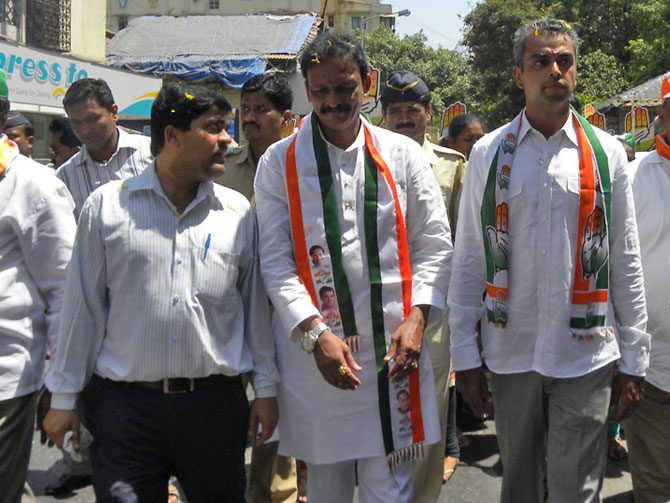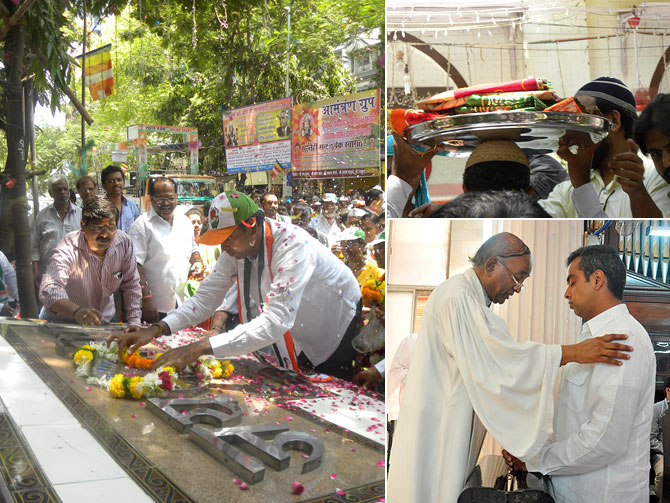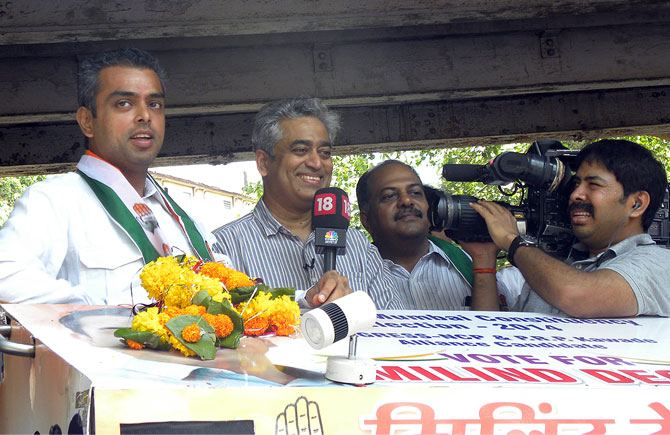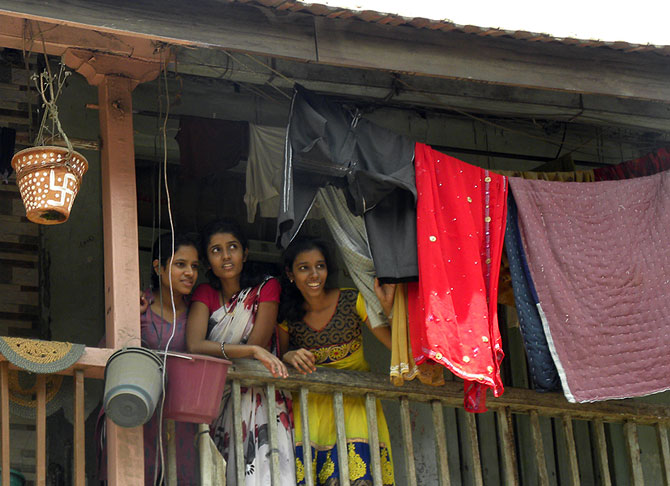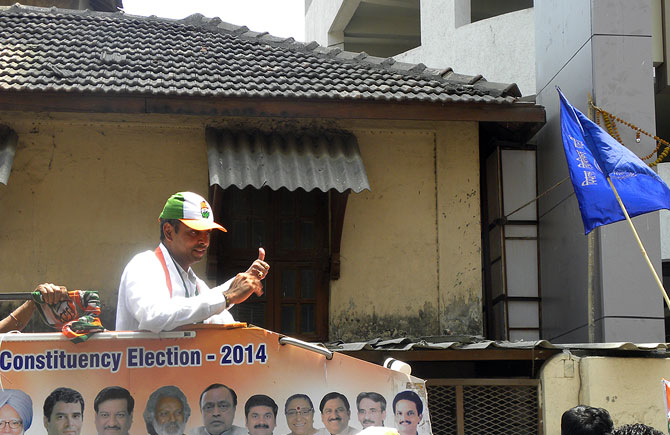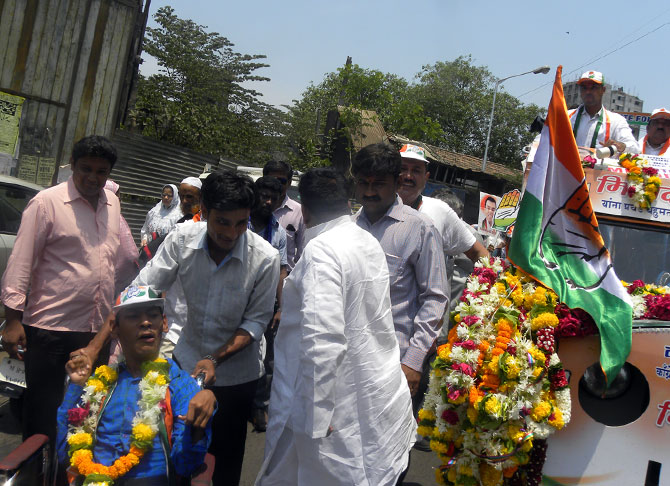 | « Back to article | Print this article |
'If I am cleansing Parliament, I am cleansing it for future generations'
'We are a party that represents the idea of India. That's why we have endured for so long. That's why we will continue to endure because we have the ability to endure, adapt, re-adapt.'
'The BJP is very good at creating hype. And then believing their own hype. This happened in 2004 also. And they will know the answer on the 16th of May.'
In arguably India's wealthiest constituency, where a miserably poor worker lives in wretched conditions hardly a few steps away from a billionaire, Rediff.com's Vaihayasi Pande Daniel speaks to Congress candidate Milind Deora atop his jeep.
Questions and answers are yelled, in hoarse voices, to and fro above the din of loudspeakers, drums, firecrackers and the smoke and fragrance of kebabs and Kheema Rotis.
Saturday afternoon offered, between election coverage, an opportunity to watch Bollywood inheritors Alia Bhatt and Arjun Kapoor, don their families' filmi mantles, to pull off 2 States.
Movie viewing was sandwiched, between observing two hectic rounds of campaigning, that day -- one morning and one evening -- by another inheritor, Milind Deora, following his family's dream, hoping to win Mumbai South constituency for the third time.
Did one really leave the cinema hall?
Or was it more like watching three films, back to back. Rather than just one.
At times, viewing Deora's brightly-lit juggernaut, lumbering into perfumed, pink blizzards of rose petals, to the roll of drums, firecracker, balloons, raucous cheering, flag waving, trailed by hundreds of people, was infinitely more cinematic and surreal than watching 2 States. Only the popcorn was missing.
Like a good Bollywood potboiler, his campaign tamasha too -- observed in snatches over a couple of days, including that Saturday, across several areas of south Mumbai -- had terrific moments of tragedy, comedy, irony and pathos.
Like at Sassoon Dock when a tall, chunky Koli mashi (aunty), her sari wrapped in traditional Maharashtrian style, marched into the road, in front of the MP's jeep, waggled a long finger and asked sternly in Marathi, "What did you do with the Rs 50 crores?"
Like how along Mohammed Ali Road, a stray dog decided to join the padyatra for the next four or five kilometres, walking along with the legion of friendly party workers, leading bystanders to call out in jest, "Kutta ko bhi paisa diya kya? (Was the dog given money to campaign too?)"
Like how one young member of Deora's padyatra sported a green T-shirt that declared loudly: 'Modi-sh Trend.' Hmm. :)
Please click Next to read further...
'This is a Congress fort'
Like when the haath gaadiwallah (hand cart puller) Sharif, who probably earns a meagre Rs 100 or Rs 200 a day, said, with his own irrefutable logic: "Why would I not vote for him? In mein koi burai toh nahin hai? (he does not seem to have any faults?)"
Like when Congress party workers got waylaid by a mango tree, bent low by its burden of fruit, in front of a cemetery in Byculla, near the historic Khilafat House. Using the ends of their bamboo flag poles, they attempted to knock down some raw fruit, a great idea for succour against 38 degree temperatures, till a senior worker came along and said, "No you can't do that, it's private property. Even though yeh Congress ka garh hain (This is a Congress fort)."
Like when taxi driver Sarnam Muzaffar, who lives at Darukhana, Mazgaon, said he does not blame the Congress, or Deora, for inflation: "Who can do anything about inflation? When I came here, in 1966, from Ratnagiri, gold was Rs 50 a tola and a cup of chai was 50 paisa."
Like when Byculla shopkeeper Dhananjay Gaekwad told me he would vote for Deora: "He must have done some work somewhere, it does not necessarily have to be in my area. It is not as if he would not have done work. He is a straightforward person."
Like how store owner Jetha Lal, at Ghodapdev Naka, Byculla, who will vote for Narendra Modi, says he has never seen Deora in this area before, but he has seen the Maharashtra Navnirman Sena's Bal Nandgaonkar many times, while a few lanes away Khan Attik and Mohammed Harul say they have seen Deora many times in the neighbourhood and not other candidates.
Like how at the Colaba bus station suddenly the trusty campaigning jeep went phut. Campaign workers crowded under the hood of the vehicle to peer, in askance, at its defeated innards. Deora didn't miss a beat.
He got down from the top of the gaadi and continued his padyatra, walking into the blazing sun towards Colaba post office, calling in on building societies and slum colonies, one after the next.
Milind Deora is running for the third time from Mumbai South, India's constituency 31, one of the wealthiest -- if not the wealthiest -- constituencies of India, where a miserably poor mathadi worker lives in wretched conditions hardly a few steps away from a billionaire.
Sitting MP and the Union minister of state for communications & information technology and shipping, Deora won by over 100,000 votes in 2009, bagging 42 percent of the votes, soundly trumping both the Shiv Sena's Mohan Rawale and the MNS's Nandgaonkar.
Nandgaonkar is also in the running this time and is the young minister's most important rival, among 19 other candidates.
The Deoras -- first, father Murli and now, son Milind -- have represented this constituency for the Congress, with gaps during three electoral failures (not on Milind's watch), for the last 34 years.
Milind, who is graying mildly, was one of the youngest MPs to be elected to Parliament at 27, 10 years ago, and is more of a modern, well-educated career politician than a neta, attempting to show his commitment through his broader-based work and Parliament profile (88 percent attendance and 274 questions asked, according to his comprehensive Web site)
But Deora is not resting on earlier laurels as he tirelessly attempts to cover every neighbourhood and mohalla in his constituency -- 1,589,811 voters, 904,733 males and 685,078 males according to the Election Commission -- from morning to late night, with each area MLA alongside.
A tall, lanky figure -- perennially dressed in a crisp white shirt, pants and black sandals, and sometimes a Congress cap -- he is calm, rather serious, clear-eyed, as he systematically, earnestly goes about meeting people, standing on top of plastic stools to make small speeches in each area, getting garlanded, and trying to make an impact.
His speeches lack bluster. Or excessive hype. They are quiet, carefully-worded appeals for continued support, presented in a reasonable tone, that matches his faintly boy-scout manner.
Please click Next to read further...
Dargah visits, church blessings, temple darshan
Elections are an open season for a candidate like Deora. Happier constituents show no mercy while expressing their affection -- it is their chance to get the best access to their MP. They make the most of it. Wherever he goes, Deora is smeared with tikkas, kumkum, haldi, garlanded sometimes with fruit, showered with petals, fed prasad, petitioned...
At a little Colaba dargah a hat is stuck on his head and he is sent for a chakkar with a thali on his head. At Byculla's Christ Church he kneels to receive a blessing on Easter from a priest. At a Dalit chawl he pays his respects to a memorial to statesman Babasaheb Ambedkar. At temples and shrines everywhere he stops by to bow his head.
An MNS parade bumps into the Congress one at Nagpada. There is a lot of waving and camaraderie across the gullies between leaders. The Congress rally pauses, allowing the MNS to move considerably ahead, before starting up again.
No area typifies the awful contrasts and bewildering ethnic variety of India, in a microcosm, perhaps more than south Mumbai, because of the yawning disparities in income between localities, in addition to cultural richness.
Each tiny basti has its own colour, place and history in the city's fabric. Leather goods lanes, iron works, fruit markets, dhobhi ghats...
Deora's jaloos (parade) is one minute moving through an intensely Muslim mohalla to emerge, hardly a few minutes later, into a deeply Maharashtrian one. Often the garlands are the first indication that the neighbourhood's identity has changed.
Garlands with more roses, white flowers and silver threads cede ground to garlands heavily decorated with orange marigolds.
Please click Next to read further...
There is more hungama, more petals, more pomp, louder firecrackers and much warmer welcomes
In neighbourhoods behind Bombay Central, like Hakim Dayam Chawl and Alibhai Premji Marg, delicate jasmine garlands await him between bloodied hanks of mutton, hanging in butcher shops, in narrow sweltering lanes.
At the British era Sassoon fishing dock, amidst piles of shelled prawns, the stench of Bombay duck, between carrom boards where seafood dock workers shoot a few coins in off time, fisherwomen patiently anticipate the young MP with hibiscus and jasmine malas and a request for water taps in their area.
Deora accepts each garland, takes it off and piles it up on the bonnet of the jeep. Bouquets find a place inside the vehicle. One garland goes around the neck of a handicapped boy who comes to meet him.
On land worth billions of rupees, bordering the shining Arabian sea, slum dwellers of unrecognized chawls rush forward to meet Deora, while hardly a disinterested head pokes out of posh buildings of multi-million apartments, overlooking the same slums.
When the cavalcade makes its way through the lanes behind Crawford Market on Saturday -- Abdul Rahman Street, Nagdevi Street, Kolsa Mohalla, Memon Wadi -- there is an even more rousing welcome and larger crowds awaiting the MP in the dusk light.
This is apparently Milind Deora terrain, traditional Congress turf, and the tape recorded message, going on a loop, reminds constituents of the old family connection.
There is considerably more hungama, more petals that Deora has to fight off, more pomp, louder firecrackers and much warmer welcomes.
At one point a red carpet even materialises and is grandly laid out onto the dusty street and Deora gets off his van to be accorded a special reception.
Please click Next to read further...
'Sena, MNS, AAP. They all have the similar birth defects of bandhs and dharnas'
Ever so often a journalist hops aboard Deora's bandwagon and conducts short interviews. On Saturday, CNN-IBN Editor-in-Chief Rajdeep Sardesai waits impatiently for Deora to start his padyatra at Sassoon Dock at 10 am. "Where are you sir? Where are you sir? We are all waiting!" he tells Deora on the phone. Deora does a half round of the dock as Sardesai quizzes him in the glare of the television camera.
While the Milind Bandwagon roams through Arab Lane and Nagpada, Rediff.com gets its turn atop Deora's jeep. Questions and answers are yelled, in hoarse voices, to and fro above the din of loudspeakers, drums, firecrackers and the smoke and fragrance of kebabs and Kheema Rotis:
How is it looking? How is the fight going?
It looks good.
We've got a good team and a good network of people who are in all parts of south Mumbai.
I think every other candidate from south Mumbai, who is fighting, is only focusing on one particular segment. My main opposition parties are focusing on one section (or another), one community.
I am the only candidate who is canvassing in every part of south Mumbai. We are the only ones focusing on entire south Mumbai -- Marathi, Hindi, Muslim, Hindu, Gujarati, slums, high rises, chawls, everything.
Why does it appear that the Opposition parties have not fielded a strong candidate against you?
You will have to ask them why they are not doing that.
I think, for example, the MNS candidate, they can argue, he is strong. He's an MLA from the area. They can't get a better candidate than that.
But it is a very big perception thing. I don't treat it that way. I treat it seriously. We know that these kinds of parties have a very divisive agenda for Mumbai and for south Mumbai.
South Mumbai is a constituency that is the economic nerve centre of India. It is where everyone -- if you have seen this area -- someone is doing some kind of auto parts (business). Someone is selling food on the street. Someone is a businessmen. Someone is a trader. Everyone is driven by some kind of economic activity in south Mumbai.
For them, what matters more than anything is a positive environment. I don't think any of my competitors have the ability to offer that -- whether it is the Sena, the MNS, AAP. They all have the similar birth defects of bandhs and dharnas.
You are fighting anti-incumbency as well.
Anti-incumbency is a very relative term. It differs from constituency to constituency, depending on who the candidates are. It depends from community to community.
India is too diverse a country to just generalise like that. There is bound to be some level of fatigue. If you have been in power for ten years, people see the same face for ten years.
Is there anti-incumbency? Is there pro-incumbency? Is there a wave in favour of somebody? Against someone? These are very relative terms which you can't really predict in a heterogeneous society like ours.
Why do you think the BJP and Mr Modi are not a good option for India?
You need to have economic growth in our country. In a coalition era you need political stability. For political stability in the country what you need is social acceptability.
If you are not acceptable by your own party, by your own allies... Like in the BJP right now there is a rebellion. Senior leaders are rebelling. Old allies of theirs are no longer with them. So they don't have that social acceptability.
Without social acceptability you cannot guarantee political acceptability. And then you cannot guarantee economic growth, policies, consistency. And that's the biggest fundamental problem of theirs.
Please click Next to read further...
'When Mr Vajpayee was PM, the RSS used to put pressure'
What do you think of Mr Modi as a PM candidate?
I think the difference between him and Mr Vajpayee was that Vajpayee allowed a right wing party, like the BJP, to move closer to the centre. Mr Modi has taken it further to the right. And that has alienated a lot of people, within his own party, within the NDA (the National Democratic Alliance). That's a gamble they have taken. We will know on the 16th of May.
Should Mr Modi come to power, will there be a dominance of the RSS way of thinking, as opposed to a perhaps more inclusive BJP way of thinking?
When parties like the BJP come to power... We as a party don't have any super boss. Today I am a minister. People come to me and say can you help me with something in the ministry. If I can help, I help, if I can't help, I can't help.
There (at the BJP) the diktat is given by a super boss of theirs. And that super boss interfered even with a moderate leader like Mr Vajpayee. With Mr Modi they will be fully percolating down. Not only causing tensions, but causing severe breakdown of governance, a serious governance deficit.
The government won't be able to budge, take decisions. They won't be able to appoint ministers.
If you remember Mr Vajpayee, when he was prime minister, the RSS used to put pressure -- Remove Mr Jaswant Singh, put Yashwant Sinha. Do this. They interfere.
We don't have that. And with a Mr Modi, they will feel our own is in (power) so it will really break down governance in our country.
A lot of people feel let down by the Congress. They feel the Congress has not stood up to Mr Modi in the strongest possible manner possible. By not fighting back, smartly, they feel the Congress is allowing a person like Mr Modi to come into power.
What do I tell people why the Congress is not fighting back the way it should?
You should tell (them) that we, as a party, are very clear about our ideals and our ideology. We don't have any doubt about it. We have never compromised on that.
We may not have done enough to communicate. That is something I can accept. Maybe our communication has been poor.
But our ideology/ideals are non-negotiable. And we firmly believe in that, right (up) from the worker all the way to (party president) Sonia Gandhi.
Please click Next to read further...
'The BJP is very good at creating hype. And then believing their own hype'
Why is Rahul Gandhi's voice not as powerful as Mr Modi's?
The way (the BJP) has handled the media, that's a case study on its own.
(Without any heat, he says) We don't believe in doing those kinds of things. They have always done that. They have done that in 2004 with India Shining. So they are good at propaganda, lies. We are not good at that and we don't know how to do that. That's a problem we have.
Is there a Modi wave?
I feel the BJP is very good at creating hype. And then believing their own hype. This happened in 2004 also. And they will know the answer on the 16th of May.
What if Congress does do badly? Gets only 100 seats? What will happen?
We will see at that time.
Will that be a blow to the Gandhi dynasty and their management of the party?
We are not thinking about that. We are single-handedly focused now on winning. Fixing the real problems of India. Not letting things get hijacked. Not letting people get polarised again.
I have seen television interviews with Mr Gandhi. He appears to be a very charming man. But he does not project himself as strongly as Mr Modi does.
Can you tell us something about him? Why should voters back him and his party? What is special about him?
Because, one, he is not asking anyone to vote for him. That's the fundamental difference between him and (Mr Modi).
Well as a representative of the Congress, then?
He is asking people to vote for the idea that the Congress party represents. And we are a team and we function as a team.
The team is not just within the Congress, it is with the people of India. That's the fundamental difference.
The opponents have spun the narrative into a one man versus another man.
That's not the way India should function. That's not the way any country should function. Even the US does not function that way.
What is Rahul Gandhi like as a person?
He believes in what he says and in what are the core ideas of the party. He's trying his best.
He is honest, he is straightforward, he is young, he has got a long way to go. He wants to bring about genuine grassroot change.
Please click Next to read further...
'We are a party that represents the idea of India. That's why we have endured for so long'
You often take strong views in your tweets and elsewhere that are not necessarily in consonance with the party's view.
I speak what I feel.
What am I in politics for?
Luckily, I have not gotten into trouble. Even my own party has always appreciated my suggestions. I never do it in a personal way. I never insult someone.
I try to redirect attention to pertinent issues and to improve things. That's how parties should run.
Should something go wrong in this election, how should the Congress resurrect itself?
(Smiles) We are not thinking that far ahead.
You said the party has not communicated properly.
Communication is an area where there is always scope for improvement.
We have to remember that in 2005, when we initiated the RTI bill -- when I initiated that bill in Parliament -- it is almost hard to imagine that before 2005 there was no RTI in our country.
Three years ago, five years ago you had 24/7 news channels. It is social media today. There is a new governance paradigm created in our country and for that we need a new communication paradigm. New strategy.
We happened to be the government of the day when this governance paradigm was unfolding. Any government would have found similar difficulties in communicating. Always scope to learn and improve.
Ultimately I believe we are a party that represents the idea of India. That's why we have endured for so long. That's why we will continue to endure because we have the ability to endure, adapt, re-adapt.
We may be a little late responding. Sometimes we may not be proactive. Sometime we may be reactive. We still have the ability to respond much better than other parties.
Do you think Mr Modi is a hardliner and his campaigning has too strong a message of Hindutva?
There are hardliners in all religions. India is not a place for hardliners. India has never accepted hardliner leaders. Never. It has never accepted a hardliner leader.
If I were a BJP member I would be very worried. I would think (maybe) Vajpayee's ability to move the party closer to the centre -- it has now gone back -- was maybe temporary. Maybe, in the end, it is elastic. It cannot stay in that position forever.
Ultimately, it is a right wing party. So in some ways they are going back to their core ideology. That ideology has limited acceptability.
You are running for the third time. What has been the greatest learning for you? How can someone in your constituency be certain that you have done work for them and will continue to do work for them?
The best learning I have had as a member of parliament, who has 15 lakh (1.5 million) voters: No member of parliament can be seen accessible everywhere, every day, to every constituent, given your job profile, where you have to spend time in Delhi. Physically impossible.
Ultimately an MP, an elected representative, works positively for the people, does not get involved in dirty politics, (does not) trouble people, works for welfare, tries his best.
The worst criticism against me is that he is not seen as much as he should. That's an acceptable criticism. But people understand the difference between somebody who is there for them and somebody who is a parachuter, every few years, during election time.
People reward (someone who is there for them), I think. Because that demonstrates reliability, sincerity, consistency.
But what if they don't see your Web site or read about the work you have done?
I think generally people know, that if I have not met them or haven't reached their building, they know that he is someone who is working and he's busy.
People understand, in the end, if someone is a sincere person, a well-meaning person.
People know I take stands. Every constituent of mine knows who am I working for, I am working for them.
Even if I cannot be available and accessible to all three million of my constituents, even if I take up these issues, and I reach them at a local level, then these issues are ultimately for the people.
If I am cleansing Parliament, I am cleansing it for them, for future generations.

